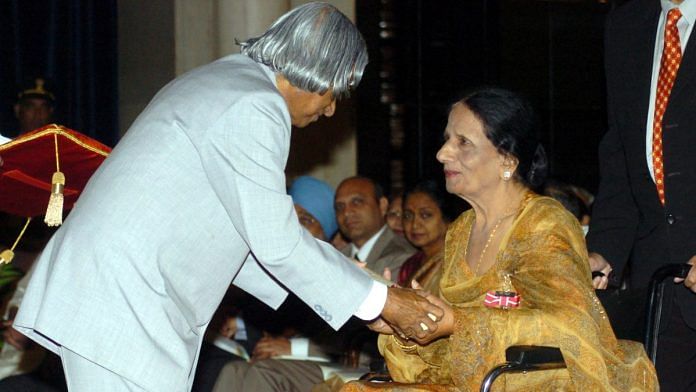When Pakistani singer Ali Sethi released Chan Kithan in 2018, it was a hit with fans in India and Pakistan. It was a close rendition of the original song sung by Surinder Kaur, the Nightingale of Punjab in the 1940s.
Seventeen years after she passed away on 14 June 2006, Kaur’s songs are evergreen and a source of many iterations and remixes. From weddings to heartbreak, her music covered the gamut of human emotions, cutting across age groups and borders.
She drew inspiration from the Punjabi Sufi Kafis of Bulleh Shah and verses by contemporary poets like Nand Lal Noorpuri, Amrita Pritam, Mohan Singh and Shiv Kumar Batalvi. Her wedding melodies, most notably Lathe Di Chadar, Suhe Ve Cheere Waliya, and Kaala Doriya— have now become an indelible part of Punjabi culture. Her songs on Punjabi women lamenting over the loss of their chan (beloved) such as Luti Heer Ve Gaman, Dard Vichore Da Haal or Ghamaan Di Raat Lammi are classics.
Her voice was almost drowned out by the rise of Punjabi pop in the 1980s. But her many admirers, from both sides of the border, have kept her songs and her legacy alive.
Also Read: Guns, gangs and glory — Sidhu Moose Wala’s music lives on in the youth of Punjab
Defying tradition
Born in Lahore in 1929, Surinder Kaur grew up in an orthodox Khatri Sikh family where singing for entertainment was not encouraged.
“When I was growing up, girls from respectable families just did not sing, except at family weddings and functions at home. That too only before an all-woman audience,” she recalled in a 2000 interview.
Her father, Jiwan Singh who taught at Government College, Lahore, was not comfortable with the idea of his daughter becoming a professional singer. Her mother, she said, was “horrified”. It was her eldest brother, Harbans Singh, a police officer, who fought for her, and insisted that if she had the talent, she should get professional training. She and her sister Prakash Kaur started taking lessons in Hindustani classical vocal music from Ustad Inayat Hussain before the family moved to India during Partition.
“The neighbourhood was scandalised that the daughters of the sardars were singing. So for our riāz, we would shut the doors, windows and even the ventilators lest the sound of music travelled outside,” Kaur recalled.
Her sister, she said, was the first Kaur to sing on radio, paving the way for her career as well. She made her debut as a singer through Lahore Radio in 1943 and sang her first song, Maavan te Dheeyan with her sister— a song that still remains a popular wedding song— about the interaction between a mother and her daughter a day before the daughter’s wedding.
Also Read: Malayali Bollywood rockstar KK sang love, friendship anthems. But fiercely guarded his privacy
Unforgettable legacy
Kaur went on to record at least 2,000 songs, mostly with her sister Prakash Kaur who was by then an acclaimed singer as well.
While still in her teens, she wed Joginder Singh, a psychology professor at Lahore. Fortunately for her, he not only loved her but also respected her talent as a singer.
The young couple relocated to Bombay after the Partition where her first foray into singing in Hindi took place. She sang in the film Shaheed (1948) starring Dilip Kumar and Kamini Kaushal. She went on to sing for films such as Laal Dupatta (1948), Nao (1948), Dada (1949), Kaneez (1949), Shadi ki Raat (1950).
Aandhiyaan (1950) was her last Hindi film, after which they moved to Delhi, where her husband would organise her shows and the two would also write the lyrics together.
It was in Delhi that her music career thrived. During this time, Surinder began performing literary works by poets in addition to the folk songs she had previously sung.
In 1952, she visited Russia on an official delegation. Nargis, Raj Kapoor, Balraj Sahni, Nirupa Roy, and the vocalist Aasa Singh Mastana were all members of this trip. She soon teamed up with Mastana to perform. They were a major hit.
The 1980s saw the beginning of Punjabi pop which was popularised by singers like Gurdas Maan and Malkit Singh. They introduced electronic elements to music. The Tutak Tutak Tutian–listening audience failed to understand the charm of Punjabi folk or the legacy of Surinder Kaur.
During the annual Rose Garden Festival in Chandigarh, a young audience booed her off stage, they wanted Gurdas Mann to sing instead. This came as a complete surprise to everyone, especially Surinder’s legion of devoted fans. She grabbed the microphone, and exclaimed, “Today, you are booing me out. But someday you’ll recall that someone called Surinder Kaur existed.”
Her premonition rang true. In the year that marked the half-century since India’s Independence, HMV, the British music label credited with laying the groundwork for the Indian music industry, released a collector’s set of five cassettes titled “50 Years of Punjabi Music”. It featured artists as diverse as film singer Shamshad Begum, folk singer Lal Chand Yamla Jatt, and Punjabi pop artists Gurdas Maan and Daler Mehndi. Two of the cassettes were dedicated entirely to the music of Surinder and Prakash.
A recipient of the Sangeet Natak Akademi Award in 1984 and the Padma Shri, she passed away in New Jersey at the age of 77 after suffering a heart attack.
(Edited by Theres Sudeep)



